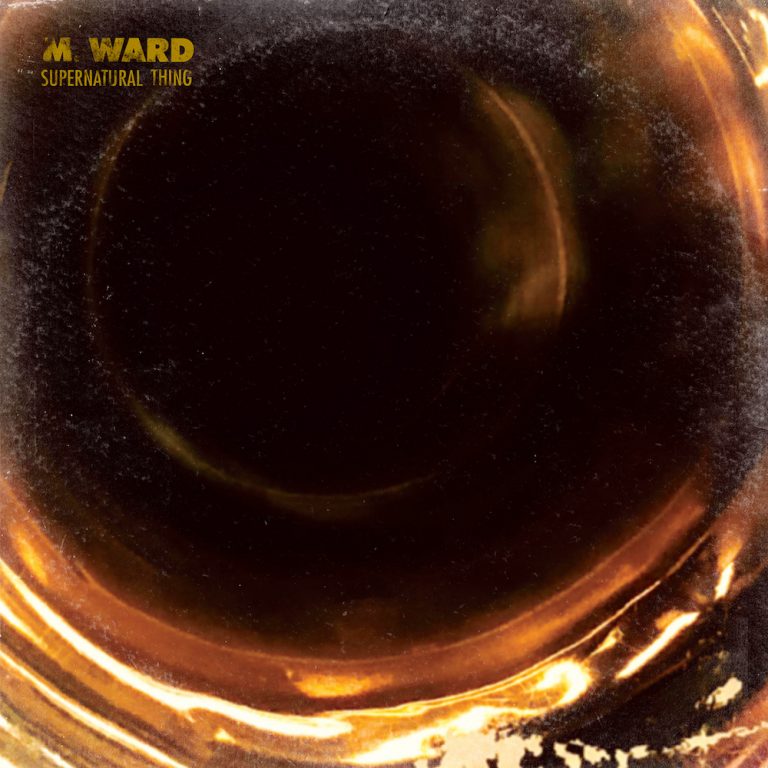Sometimes, it feels like it’s been a minute since we’ve last heard from singer-songwriter M. Ward, but then you remember he’s always right there. Every few years, Ward puts out another collection of reliably rustic, dusty folk pop, all sung in his indelible, honeyed voice. No one sounds quite like him, and yet, that aforementioned feeling that it’s been a while since hearing his last record is indicative of a bit of a problem that’s been growing across his discography. Ever since releasing his impeccable Post-War in 2006, Ward has been a slow and unfortunate journey of slightly diminishing returns, and his newest effort, supernatural thing, doesn’t do enough to stave off that feeling.
Actually, there’s not an exact moment when the slippage really started, except that vague mid-2000s era, as Ward found more widespread success and embarked on the still-ongoing partnership with actress Zooey Deschanel as She & Him. As the pair released album after album of sun-dappled indie pop, Ward kept churning out his own personal records, such as the 2009’s gauzy Hold Time or the stormy day totem More Rain. His last album, Think of Spring, was actually a set of Billie Holiday covers, which he handled with gentle aplomb. But somewhere along the line, it became clear that Ward was mostly settling into his comfort zone. His albums since 2006 are all enjoyable affairs, if not exactly pressing or particularly inspiring. His rusty Americana can truly only go so far.
On paper, supernatural thing looks like it makes some effort to spice things up. Namely, this comes in the way of having several guests appear across the album. We all remember when Neko Case breathed a brick-red sunlight onto Ward’s take on Daniel Jonston’s “To Go Home”, or when he swayed sensuously with a torchy Lucinda Williams on “Oh Lonesome Me”, originally a Don Gibson cut. But rarely has a collaborative nature been so much of the appeal of an M. Ward album, and the guests here don’t disappoint. In fact, they’re often the highlights.
Sister duo First Aid Kit lend themselves to two separate tracks, essentially taking lead on both. The understated bossa nova shuffle of “too young to die” starts with their voices, strong as ever, eventually blooming into their trademark harmonies. Ward himself comes in over a minute in, and feels like a guest on his own song — which is fine, when you have First Aid Kit handling the reins. But despite a lovely chorus melody, the verse melodies don’t do any of the singers many favors. Later, the more rollicking “engine 5” sees them taking lead again, and their commanding presence does a lot to send the song into the stratosphere, crafting a bit of urgency (even if it does fade out too quickly) that is lacking on much of the rest of the album.
And that’s not to say that an M. Ward album can’t indulge in his comfortable zone of gentle, woozy Americana. But some of the songs here simply lack much of anything terribly memorable. The opening “lifeline” comes in like a lost radio recording, with a pleasant assemblage of guitar strumming (Ward is nothing if not a very tasteful and deft guitarist). But then Ward comes in, sings some quick lyrics, and the song fades away unceremoniously. The title track has a rolling beat and nimble bass, but it doesn’t leave much of an impression. “new kerrang” has an exciting two and a half minutes, but then right before it fizzles away on a bed of gurgling synths, it comes back for a wholly unnecessary instrumental reprise, making a fun song feel sluggish by the end. And “mr. dixon” relies almost entirely upon a faceless hook of “mr. dixon wrote!” sung over and over again, while its verses amble aimlessly over a slightly mismatched instrumental. It fails to land too hard, despite a nice contribution from Shovels & Rope and… frog sounds? Even his Bowie cover, “i can’t give anything away”, which has some remarkable horn work, falls a little flat with its placement as a breather in the middle of the album. That it’s simply an instrumental version also adds to a bit of confusion: why is this specific song here?
In fact, outside of the two First Aid Kit tracks, the highlights on this album are usually the tamer moments. “For Good” has a lugubrious melody that its lyric actually justifies, with heartsick lines like “Hard to say goodbye / When you know that it’s goodbye for good”. And Neko Case makes a sumptuous, grand return on the gorgeous, almost 60s-ish ballad “dedication hour”. It sounds like it’s beaming across some arid desert under a bright big moon. It’s relaxing, but also slightly eerie, in the way that some of Ward’s best songs are.
But despite this album being pedalled as a sort of spiritual successor to one of Ward’s best, Transistor Radio, it’s almost hard to believe that the same person who wrote some of the songs on this record wrote those — let alone that he wrote a song as impossibly beautiful as “Post-War” or as timeless as “Sad Sad Song”. As it stands, supernatural thing sounds impeccable, moves fluidly, and is perfectly enjoyable. It’s another reminder that M. Ward does what he does very well, just like most of his past few albums. But at this point, so many years on from those first few records, we have to wonder: is that enough anymore?

